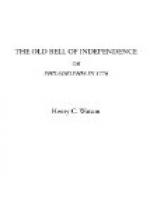“To the head-quarters of General Prescott, about a mile from the shore, a party in five divisions now proceeded in silence. There were doors on the south, the east and west sides of the house in which he resided. The first division was ordered to advance upon the south door, the second the west, and the third the east, the fourth to guard the road, and the fifth to act in emergencies. In their march they passed the guard-house of the enemy on their left, and on their right a house occupied by a company of cavalry, for the purpose of carrying with expedition the orders of the general to remote parts of the island. On arriving at the head-quarters of the enemy, as the gate of the front yard was opened, they were challenged by a sentinel on guard. The party was at the distance of twenty-five yards from the sentinel, but a row of trees partially concealed them from his view, and prevented him from determining their number. No reply was made to the challenge of the sentinel, and the party proceeded on in silence. The sentinel again demanded, ‘Who comes there?’ ‘Friends,’ replied Barton. ‘Friends,’ says the sentinel, ‘advance and give the countersign.’
“Major Barton, affecting to be angry, said to the sentinel, who was now near him, ’Damn you, we have no countersign—have you seen any rascals to-night?’ and, before the sentinel could determine the character of those who approached him, Major Barton had seized his musket, told him he was a prisoner, and threatened, in case of noise or resistance, to put him to instant death. The poor fellow was so terrified, that upon being asked whether his general was in the house, he was for some time unable to give any answer. At length, in a faltering voice, he replied that he was. By this time each division having taken its station, the south door was burst open by the direction of Major Barton, and the division there stationed, with their commander at their head, rushed into the head-quarters of the general. At this critical moment, one of the British soldiers effected his escape, and fled to the quarters of the main guard. This man had no article of clothing upon him but a shirt; and having given the alarm to the sentinel on duty, passed on to the quarters of the cavalry, which was more remote from the head-quarters of the general. The sentinel roused the main guard, who were instantly in arms, and demanded the cause of alarm. He stated the information which had been given him by the soldier, which appeared so incredible to the sergeant of the




